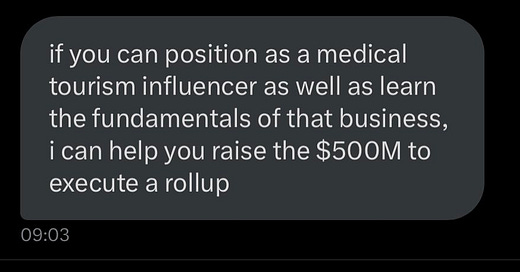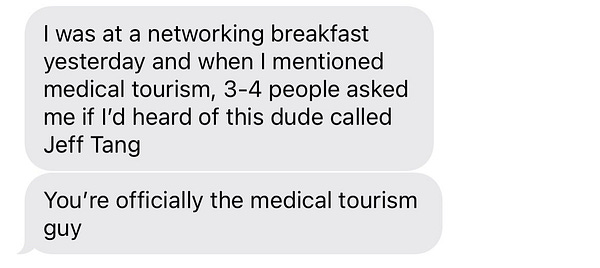What Hasn’t Been Tried Yet in Medical Tourism
Build an Audience First, Vertically Integrate, Unlock Supply, Go B2B
Shoutout to Antonia Alvarez for being paid subscriber numero dos. Antonia organizes founder retreats when she’s not PMing. She is joining Yazin from Amal Invest, who’s creating halal stocks. I still do not have any gated content but I appreciate the support guys ❤️🔥
Previous posts
Table of Contents
While quite a few medical tourism marketplaces and startups have been tried, it seems like they mostly try the same things. They typically pick a niche (Home ∩ Destination ∩ Medical category), run paid ad campaigns, and provide lead generation for clinics and concierge service for patients.
In today’s post, I’ll list some approaches I haven’t seen yet. I’ll end with a “Master Plan” for building a medical tourism company.
Build an Audience First
Given that the primary hurdle for patients doing medical tourism is information, education, and trust, I think building an audience and/or community is an interesting initial wedge.
Simply being the “Medical Tourism Guy” seems like a viable influencer niche. I am already getting early signs of traction here in the startup circles of San Francisco because medical tourism is such a niche vertical.
General advice on marketplaces is to acquire supply first. But in the case of medical tourism, I think it’s very clear that aggregating demand first makes more sense. Countries want American tourists (except for when we are annoying, which is most of the time).
Examples of audience or community-first companies.
Vertically Integrate

Owning or Acquiring Clinics and Hospitals
OpenDoor and Zillow tried to buy and sell real estate at scale.
Wander is constructing and managing their own homes.
Hadrian is aggregating and connecting manufacturing machines.
We could vertically integrate by us literally becoming a care provider and owning clinics and hospitals around the world — OneMedical for Medical Tourism Clinics™.
Why does this make sense?
First, in my previous post, I said I don’t think marketplaces are a good biz model for healthcare even if they do get to market leadership, based on how both ZocDoc and Practo (ZocDoc for India) seem underwhelming for having raised hundreds of millions of dollars.
Second, and perhaps this is an extension of the first, medical tourism is low frequency, low repeat usage, and therefore low stickiness and mindshare. There’s a natural ceiling by not being the go-to place for medicine and healthcare in consumers’ minds more broadly.
Third, it’s hard to imagine a medical tourism company being successful without having a strong domestic presence and network of doctors. Post-treatment care is perhaps the trickiest part for delivering successful medical tourism treatments, arguably even more important than the procedure itself.
This would be more of a capital-heavy / asset-heavy / ops-heavy / private equity rollup play than a pure software startup play. Indeed, if you look at OpenDoor, Wander, Hadrian, and any “PropTech” company (cough, WeWork), their core competencies are more so financial engineering than software engineering, even if their CEOs can spin up good narratives about how cutting-edge their technology is.

Insurance
It’s also hard to imagine a hugely successful medical tourism company not providing its own complication insurance, if not health insurance, as well.
A company here should probably have its own in-house complication insurance. There are quite a few nomad/international health insurance companies, but these are generally for worst-case scenarios. See SafetyWing, With Faye, and Insured Nomads.
Focusing on complication insurance probably requires unique underwriting, but that would be a key value proposition for a medical tourism company, which should be uniquely positioned to provide this given a proprietary data set.
On the backend, Airbnb is a regulatory, insurance, and payments company.
On the backend, healthcare is a regulatory, insurance, and billing business.
MedRepublic, a medical tourism marketplace that pivoted to offer more tools for clinics, says they offer complication insurance. Not sure if it’s good or not.
There’s probably all sorts of membership perks where one gets access not just to insurance but discounted access to preventative, diagnostic health tests for clinics around the world. Insurance is the OG Groupon / group-buying — pooling together people to negotiate better rates with care providers.
Unlock supply
This section is the longest and most half-baked one in this post, so bear with me, and feel free to skip it, unless you’re a marketplace nerd.
Many generational marketplaces did not just match supply and demand. They unlocked underutilized supply, usually through enabling brand new forms of peer-to-peer value creation, e.g. eBay, Airbnb, Uber. Previously dormant assets or skills transmogrified into cash-flowing jobs and utilities.
No prior medical tourism companies unlocked supply. They mostly stuck to connecting existing supply and demand, functioning as outsourced lead gen and concierge services for clinics abroad. But increasing efficiency is often less compelling than creating new categories of economic value.
Fora Travel is a recent example of a travel startup unlocking latent supply by innovating at the business model and distribution layers. Fora makes it easy for hobby travel aficionados to become part-time or even full-time travel agents. Fora’s insight is that everyone knows a travel nerd, AKA a person with reputation in their own circles for being the go-to person for travel tips, but that these people aren’t converting their knowledge, expertise, and networks into a source of income. More importantly than monetizing your passions™, Fora travel advisors can get their friends sweet travel perks like VIP upgrades and free breakfasts — I officially became a Fora travel advisor this week, so hit me up with travel questions and tips 😉. It’s a “creator/passion economy” play, but not for content creators or influencers in the way we typically think of.
One pattern I noticed while talking to people who had done medicine abroad was that it was mostly through word of mouth. And then I realized that a lot of finding medical care operates through word of mouth. And then I realized that every market operates heavily through word of mouth — travel, restaurants, medicine, investing, etc. — and perhaps WOM is a feature to be leveraged rather than an inefficiency that should be "solved" with traditional search engine, information aggregator, or marketplace approaches.
I do not know who the best doctors are in any town I’m in, including my hometown, and I’m not sure how I’d find that out besides asking my friends in medicine. If my neck hurts, I ask my friends and colleagues if they’ve had an issue with that and how they treated it.
I don’t see average Joe’s turning into nurses or doctors in their spare time, but I wonder if something similar to Fora could be done in the world of medicine, where a lot of latent, untapped value probably lies in patient-to-patient networks, doctor-to-doctor networks, and some intersection of the two.
The best example of patient communities improving outcomes is Alcoholics Anonymous. Some healthcare companies I’ve found that are leveraging networks, community, and crowdsourcing are PatientsLikeMe, Alike, and CrowdMed.
Go B2B
Clinician Side
QunoMedical and PulseProtocol both repositioned from medical tourism marketplaces to selling software tools to hospitals and clinics.
Quno:
Several hospitals in Germany and the rest of Europe already use the software at a total of over ten locations and manage more than 120,000 patients with it.
Once you’re working with hospitals that big, it’s probably similar to doing enterprise deals, where one hospital has tens of thousands of seats, with ACVs in the millions.
If you’re going after SMBs in Turkey, Mexico, Thailand, etc., it’s a whole different story. It sounds pretty intractable to sell the same tool to doctors in different categories and in countries this different. You’d get ultimately beaten by local companies that understand the local doctors, regulations, etc. better, and can probably sell it for a lower cost. It doesn’t seem like the analogies of Mindbody or OpenTable in the US could apply, which started as SaaS for SMBs and eventually turned into marketplaces.
That said, there does need to be a shared interface somehow between networks of doctors for billing, medical records, compliance, etc.
Company Healthcare / HR Perk
It doesn’t seem like any of the marketplaces really penetrated businesses as a healthcare or HR perk.
Given that the best categories for medical tourism are electives, specifically cosmetics like hair transplants or face lifts, it’s unlikely a company would pay for that.
That said, the one medical tourism category I could see more companies offering is fertility. Anecdotally, I’ve heard of a few women working at Facebook purely for this perk.
Generally speaking, fertility is an area to watch out for this next decade. I believe there will be a quite a few successful startups just focused on fertility.
Conclusion
In summary, the things I haven’t seen medical tourism companies do yet are:
The final solution might include elements of all of them.
The simplest strategy, to start, would be 2-phase:
Become a media company — aggregate demand
Become a healthcare company — aggregate supply
This opens up a few questions:
Why is there no known “medical tourism guy” or medical tourism media company yet?
If no one has tried this in the past, why not?
If people tried in the past and failed, why did they fail?
Is building an influencer/media company for medical tourism uniquely possible now for some reason, e.g. more location-independence post-COVID, American healthcare cost & trust at a breaking point, maturation of social media platforms, etc.?
Are there already PE firms doing rollups in LATAM?
I have a friend who worked for TPG, one of the biggest PE firms, and helped finance and acquire hospitals in Southeast Asia. If there is money to be made in PE rollups in LATAM, then there must be PE firms that have already tried this. Same questions as previous:
If they tried this, did it work out?
If they didn’t, why not?
I am officially out of San Francisco after an amazing 3 months there. We ended with a full Pivot Party and Panel, pics coming soon. I should do a recap on my time in SF to be honest.
I’m in Utah this week, then Costa Rica for 3 weeks to visit medical tourism clinics, then Prospera for a biotech conference, and then Ecuador for a founder retreat (organized by Antonia!). Do let me know if you have places or people I should see while in LATAM. I hope to be in LATAM for 3 months at least, researching and creating content around medical tourism.
Also, I just became an official Fora travel advisor who can get you perks at hotels, cruises, transportation, tours. Hit me up if you are about to book a hotel and I’ll try to get you some upgrades! 😎






Why aren’t these posts getting more comments? Really appreciate and enjoy the sharing of this story, Jeff.
Heya! I DM'd you on Twitter :)